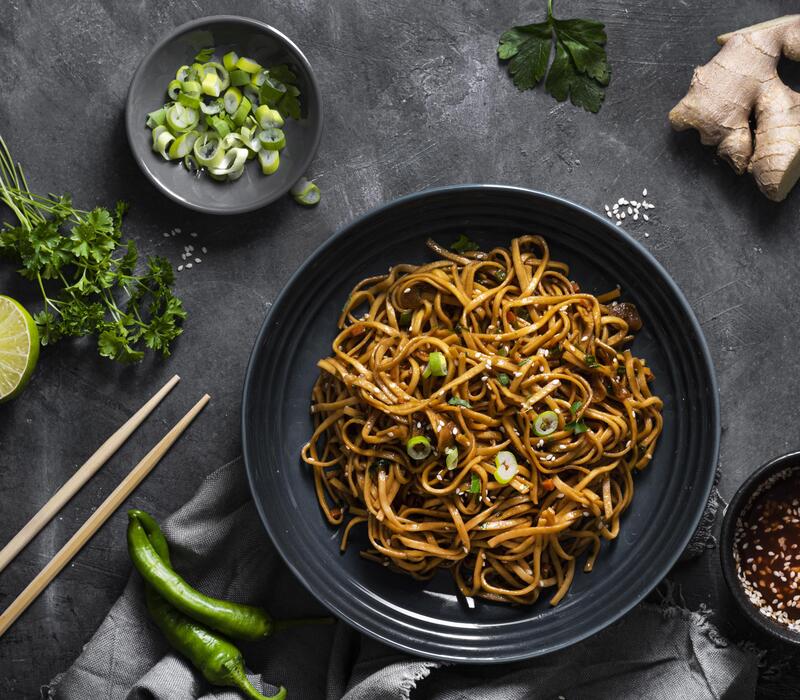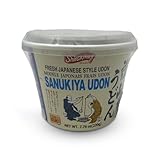Discuss are udon noodles healthy for you. When included in a balanced diet as well as consumed in moderation, udon noodles can be a nutritious food option. Udon noodles are a great source of complex carbohydrates which give the body energy. They are prepared from wheat flour, water, as well as salt.
Moreover, they provide modest amounts of many vitamins and minerals, fiber, as well as protein. Udon noodles are a processed meal as well, so based on how they are preparing and served, they may be heavy in calories, sodium, as well as carbs.
For instance, udon noodles in soup may contain fewer calories as well as sodium than udon noodles stir-fried with additional sauces and oils. When eating udon noodles, it is really important to take the other ingredients as well as portion proportions into account.
A meal can make healthy and much more balanced by including veggies, lean protein, as well as broth-based soups.
Overall, udon noodles may be a nutritious addition to your diet.
Along with this, when used in moderation, it is really important to pick healthier preparation techniques. Also, as well as pay attention to portion sizes to prevent calorie as well as sodium overconsumption.
Page Contents
Udon Noodles Health Benefits and Suggestions
Udon noodles are a type of wheat-based noodle popular in Japanese cuisine. Although that frequently use in soups as well as stir-fries. These are some possible advantages as well as suggestions for consuming udon noodles:
Udon noodles are healthy and made from whole grains are a wonderful source of dietary fiber. However, which can help with digestion as well as control blood sugar.
A good source of protein and numerous important elements. Iron, magnesium, as well as B vitamins, can be present in whole wheat udon noodles.
Udon noodles often have a low glycemic index than other varieties, which might help you feel fuller for longer as well as prevent blood sugar increases.
Try to be including a variety of vegetables as well as lean protein, such as tofu as well as shrimp. Just to keep your udon noodle meal healthful.
To reduce the sodium in your meal, think about using low-sodium broth as well as preparing your own from scratch.
Using excessive amounts of oil as well as high-calorie sauces might increase the number of calories and fat in your meal.
If you want to eat fewer carbohydrates, consider substituting shirataki noodles as well as spiralized vegetables for udon noodles.
Check out the other noodles recipes I have on my blog if you love these noodles.
Udon Noodles for Children
When included in a balanced diet as well as consumed in moderation, udon noodles can be a nutritious food choice for children. A variety of Japanese noodles called udon are produced from wheat flour, water, as well as salt.
They are low in fat as well as a fantastic source of carbs, which provide your children with energy. But it is really important to keep in mind that, depending on how they make. Along with this, many available on the market udon noodle dishes could be heavy in sodium as well as calories.
Because that udon noodles healthy include gluten, it is really important to take into account any possible food allergies as well as sensitivity that a child could have.
Overall, when eaten in moderation especially combined with other nutritious foods like vegetables, lean protein, as well as healthy fats. Udon noodles can be a delightful and nutritious supplement to a child’s diet. Udon noodles should only eat occasionally as part of a balanced as well as balanced diet, as with any food.
Depending on several factors, including the serving size, preparation method, as well as other ingredients included in the dish. Udon noodles can have favorable as well as bad effects on your children’s health. The following are some effects of udon noodles on health, both positive and negative.
Positive Impacts
Udon noodles healthy are a fantastic resource of carbs, which the body uses as energy. The body uses carbohydrates as its main food source, and udon noodles can support the recovery of energy reserves.
Udon noodles often have little to no fat, which is good for anyone trying to limit their intake of fat. For people seeking a low-fat source of carbs, they are a suitable choice.
Udon noodles provide a little amount of fiber, which can help in regulating digestion as well as foster a feeling of fullness. Anyone trying to control their weight as well as enhance their digestive health may find this helpful.
Udon noodles can utilize in soups, stir-fries, as well as salads, among other meals. It is simple to implement because of its adaptability. They are simple to include in a balanced and nutritious diet because of their flexibility.
Negative Impacts
Certain udon noodle dishes sold commercially may be high in salt, which may be harmful to people with high blood pressure as well as other medical issues. When eating any udon noodle meal, make sure to verify the sodium content.
Certain udon noodle dishes may contain a lot of calories. Especially if they contain high-fat items like seafood that has fry as well as meats that have been rendered in oil. It is really important to pay attention to portion sizes as well as pick foods with fewer calories.
Gluten intolerance as well as liver disease sufferers should avoid udon noodles because they manufacture from wheat flour. However, when eaten in moderation as well as combined with other nutritional components, udon noodles may be a healthy as well as nourishing dietary option.
To make sure that the dinner is nutritious and very well, it is really important to pay attention to the cooking technique as well as other ingredients utilized in the dish.
Conclusion
In conclusion, udon noodles could be a nutritious addition to your diet. However, if you consume them in moderation as well as prepare them properly. Udon noodles healthy are an excellent source of fiber, carbs, as well as a few important minerals including calcium and iron.
It is crucial to keep in mind that many udon noodle meals are heavy in sodium as well as calories. Particularly if they serve in a broth with high fat as well as tempura that has been fried. Try boiling udon noodles in broth as well as water without any additional oil and adding more veggies as well as lean proteins to the dish to make it healthier.
You can also search for whole wheat as well as buckwheat udon noodles, which are richer in fiber and protein than conventional udon noodles if you worry about the nutritional worth of udon noodles.
When eaten in moderation as well as prepared with an eye toward nutrition, udon noodles may generally be a tasty as well as healthful option. The overall balance of your diet as well as portion size should take into account, just like with any other food.
FAQs
Udon noodles are produced with wheat flour, salt, as well as water to produce thick, chewy noodles. They are a main ingredient in many soups as well as stir-fried meals in Japanese cuisine.
With a decent source of carbohydrates, some protein, fiber, as well as vital elements like B vitamins plus iron, udon noodles can be a nutritious meal option. However, their nutritional content might differ considerably on how they are prepared as well as what ingredients are added to them.
Udon noodles healthy are not gluten-free because they are manufactured from wheat flour. Udon noodles should be avoided by those having gluten intolerance as well as celiac disease, or gluten-free substitutes should be used instead.
If udon noodles are served in a salty broth as well as sauce, the sodium content of the dish may be significant. It is crucial to read nutrition labels as well as, when possible, select lower-sodium products.
A good, balanced diet that includes udon noodles can help you lose weight since they give you energy as well as make you feel full. When making them, it’s crucial to pay attention to portion proportions and pick lower-calorie toppings as well as sauces.
Udon noodles (approximately 2 ounces dry) typically provide 200 to 250 calories per serving.
It Is ideal to prepare udon noodles in a broth and stir-fry with a variety of vegetables with lean protein sources, like tofu, chicken, as well as fish, to enhance their health benefits. Avoid fried as well as high-fat toppings and use sauces as well as broths with a lower salt content.







